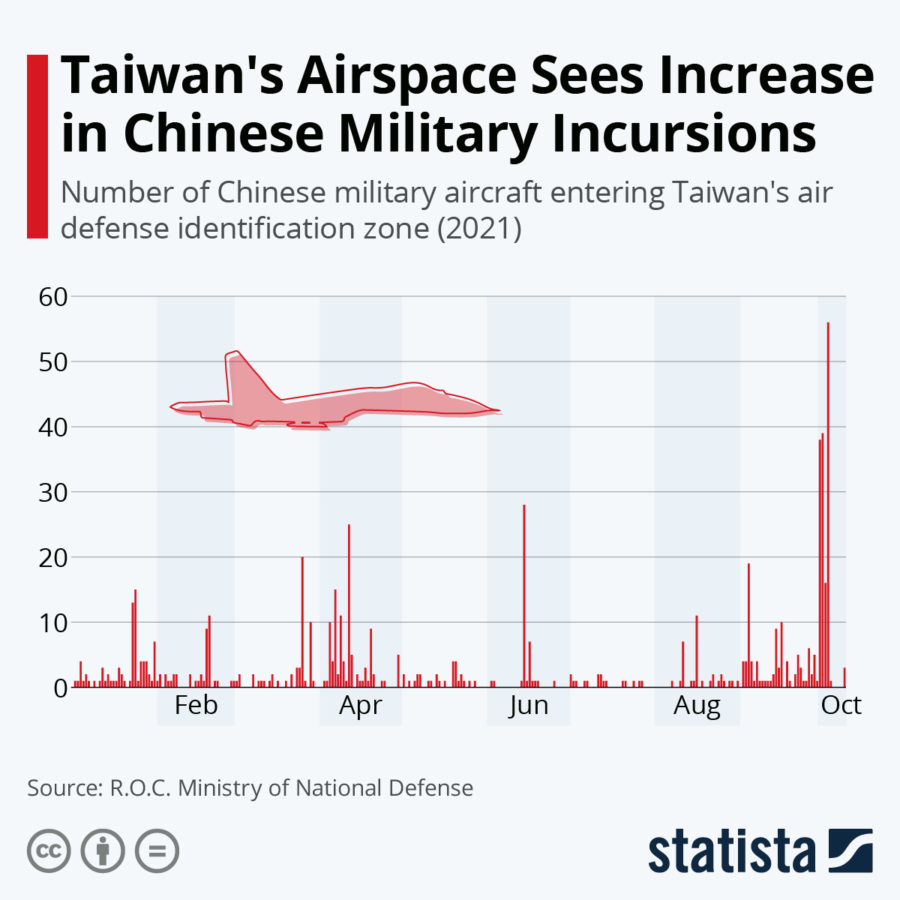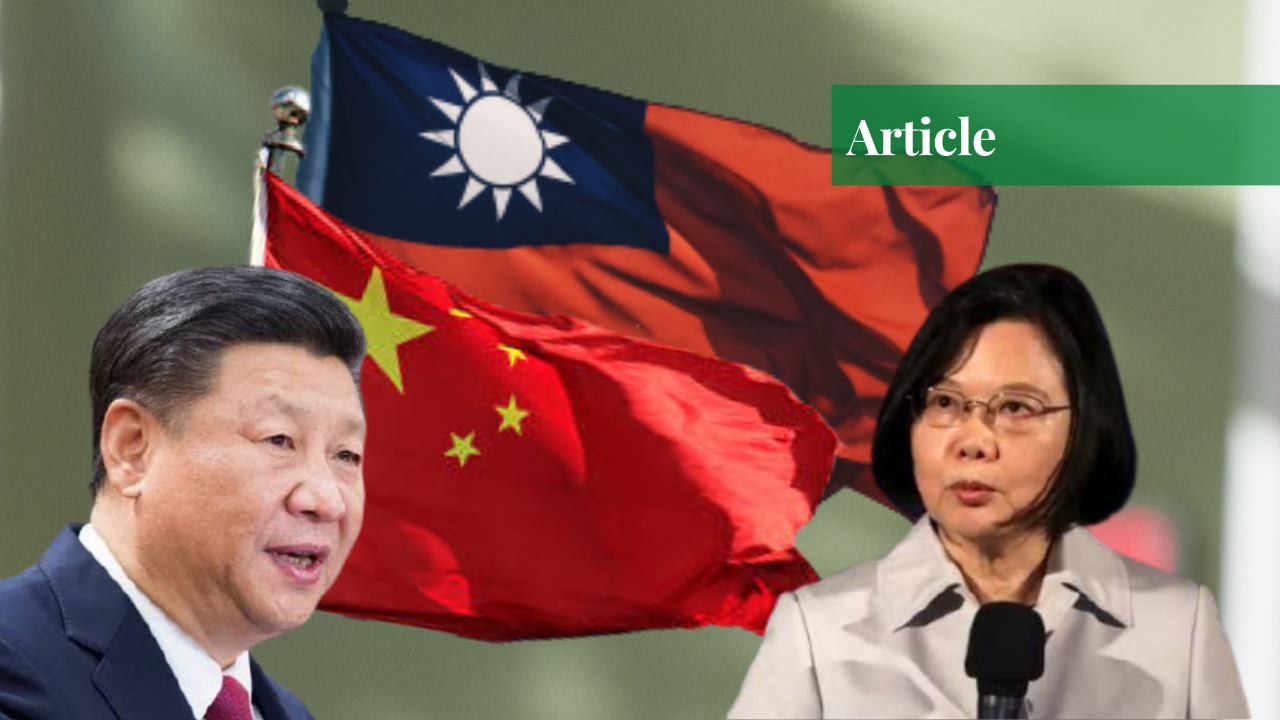Ms. Alina Fayaz is currently pursuing a Bachelor's in International Relations from National Defence University, Islamabad.
Why Does China Claim Taiwan?
The Chinese claim over Taiwan traces back to 239 AD during an expedition; however, relations between China and Taiwan began improving in the 1980s when China came up with the idea of “one country, two systems”, giving Taiwan autonomy if it allowed Chinese reconsolidation later. The China-Taiwan conflict can be traced back to the 17th century when the Chinese migrated to Taiwan and grew their population for the next 100 years, outnumbering Taiwanese natives.
Later in 1887, Taiwan became part of China as a province that ceded it to Japan and remained under its control till 1945. For the past 126 years, China has lost its lawful control over Taiwan. The core of separation undermines the Chinese government’s consideration of Taiwan as a breakaway region that will, in the end, be a part of the nation once again.
For the leaders of Taiwan, the region is more than a province; it is a sovereign state. The contested region has predicted a sharp turn in coercive expansionism of China with the international community, based on revisionist history, considering the Chinese claim that Taiwan has ‘always been’ part of China a dubious one.
Xi Jinping’s Reunification Dream
Beijing has always been willing to conquer Taiwan, but recent Chinese activities and the start of Mr. Xi’s new term in 2022 have made many analysts predict that this tenure will compel him to decide the fate of the island in Beijing’s favor. The recent entrance of Chinese military planes into the air zone of Taiwan indicates the seriousness of the incorporation of that island and the potential use of force to ‘reunify’ China.
Taiwan has all the characteristics to stand as an independent state and most importantly its majority wants ‘Taiwan to stay like that’. McBride has indicated a speed up in the desire to annex Taiwan as follows: “Reunification with Taiwan has been the goal of Chinese presidents ever since the formation of the People’s Republic of China and Xi is determined to achieve this under his leadership”.
Recent Activities
Tensions between Taiwan and China have escalated since the beginning of this month when Chinese military jets entered the air defense zone of Taiwan for four consecutive days. The defense minister of Taiwan warns about the risk of an accidental strike between China and Taiwan. China is standing strong on its notion and its officers have warned both US and Taiwan “not to play with fire on the Taiwan issue and immolate themselves.”
President Tsai Ing-wen has vowed to bring Taiwan under Chinese control as a “great rejuvenation of Chinese nation”. Ms. Tsai, however, has clearly warned that Taiwan will not bow before China and “would do whatever it takes to defend itself”. On Taiwan’s national day speech, she again expressed a desire to secure peace and have a dialogue with China.
The US’s Involvement
The self-ruled island of Taiwan is independent in most of its senses but depends on the US for its defense, especially to stand up against China and oppose the reunification of Taiwan with China. Thus, the US plays a key role in intensifying the hostility and conflict between Taiwan and China. The American influence in Taiwan and its ties with Australia has even impacted China-Australia relations. The president of the US has guaranteed Taipei sustained backing in this matter and has been escalating its outreach to Taiwan.
This includes high officials’ visits, statements from President Joe Biden, and warnings from the US that proactive military actions challenged the peace and stability in the region. The US has been alarmed by the Beijing invasion of Taiwan where President Joe Biden called its commitment to Taiwan “rock-solid”.

US Admiral John Aquilino, the person in charge of the Pentagon’s Indo-Pacific Command, said that “The Chinese Communist party has generated some capabilities in the region that are designed to keep us out…. The most dangerous concern is that of a military force against Taiwan.” Some of the leaders from Beijing expressed the fear that the US is cementing pro-independence tendencies through its support for Taiwan.
Washington is also trying to cool the matter down by agreeing on the standing agreement and arrangement of a virtual summit in the future. However, the military dominance of the US is slowly eroding, and the Afghan withdrawal has added fuel to the fire. The failure of the US to deal with the pandemic and other political disturbances has increased Chinese confidence as the administration now thinks that American power has faltered.
Where Will It Lead To?
Any Chinese president would disfavor Taiwan’s autonomy and then it would be difficult to politically survive. Therefore, this issue has always been part of the security and foreign policy of China. In the recent era, Chinese influence over the sphere has increased considerably and the internal issues have become significant.
Simultaneously, the Chinese authority is not set in stone to signal to resolve against a more prominent commitment by the US in the locale, something found in Beijing as being based on aggression towards China. So, the dangers of a conflict between Taiwan and China and a heightening of equipped clash in the Taiwan Straits are a significant concern.
Implications for India
India has its clashes with China at the Line of Actual Control (LAC) and it is suggested that the One China Policy should be reviewed. Taiwan and India have had cultural and trade exchanges and high-level visits. This conflict between Taiwan and China will further glue the two sides and will add to the hostility towards China. The rivalry between China and India is expected to get deep with time, and India is in a position to use the Taiwan card for its cause.
The Fate of the Island Nation
The ongoing situation clearly indicates that the two leaders are not ready to bend. With time the situation is expected to take sharp changes since the US and India can play an active role and manipulate this situation for their benefit. Chinese forces might seize the twenty-four million people of the island, but the economy and international relations would be at a great stake.
Thus, China is unlikely to go for a confrontation, but if the need arises, China is ready to do so. Taiwan is also preparing the island for a confrontation and is ready to preserve its autonomy at any cost, as the leaders say that they are increasing their deterrence and are ready to do whatever it takes.
If you want to submit your articles and/or research papers, please check the Submissions page.
The views and opinions expressed in this article/paper are the author’s own and do not necessarily reflect the editorial position of Paradigm Shift.



















